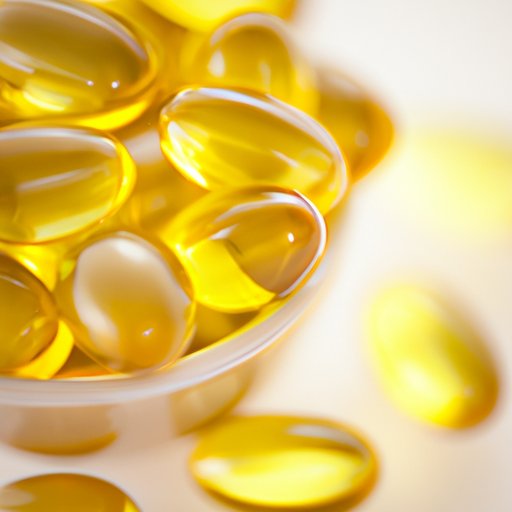
Introduction
Vitamin D is essential for maintaining bone health, strengthening the immune system, and promoting overall health and well-being. It helps the body absorb important minerals like calcium and phosphorus. Unfortunately, many people are deficient in this important vitamin, which can lead to a variety of health problems. One of the biggest dilemmas facing people who want to supplement their vitamin D intake is choosing between vitamin D2 and D3. In this article, we’ll explore the difference between these two forms of vitamin D and help you decide which one is best for you.
The Vitamin D Dilemma: Understanding the Difference Between D2 and D3
Vitamin D2 and D3 are two forms of vitamin D that are important for good health. Both forms are created when the skin is exposed to sunlight and can also be obtained through diet or supplements. However, there are some differences between the two forms that are worth discussing.
Vitamin D2 (ergocalciferol) is produced by plants, whereas vitamin D3 (cholecalciferol) is produced by the body when the skin is exposed to sunlight. Vitamin D2 is often found in fortified foods like milk, cereals, and orange juice, while vitamin D3 is commonly found in fatty fish like salmon and tuna.
Your Ultimate Guide to Vitamin D2 vs. D3: Which One is Right for You?
There are several factors that determine which form of vitamin D is best for you. These factors include:
- Your health goals
- Your current vitamin D levels
- Your diet
- Your skin tone
It’s important to note that both vitamin D2 and D3 have been shown to raise blood levels of vitamin D, so both forms can be effective in supplement form. However, some research suggests that vitamin D3 may be more effective at raising vitamin D levels in the body, especially in individuals who are deficient in vitamin D.
It’s also worth noting that certain groups of people may benefit more from one form of vitamin D than the other. For example, individuals who are vegan or vegetarian may prefer vitamin D2, as it is derived from plants. However, individuals who are deficient in vitamin D or have a harder time absorbing nutrients may benefit more from vitamin D3, as it is easier for the body to absorb.
A Breakdown of Vitamin D2 and D3: Similarities, Differences, and Benefits
Structurally, vitamin D2 and D3 are similar, but they have some notable chemical differences. Vitamin D2 is less stable and has a shorter shelf life than vitamin D3. Additionally, vitamin D3 appears to be more effective at raising vitamin D levels in the body.
Both forms of vitamin D have similar benefits, such as improving bone and teeth health, reducing the risk of chronic diseases, and supporting the immune system. However, vitamin D3 may be more effective at raising blood levels of vitamin D, which can help prevent nutrient deficiencies and support overall health.
The Importance of Vitamin D: Debunking the Myths Surrounding D2 and D3
There are several myths surrounding vitamin D and the different forms that it comes in. One common myth is that one form of vitamin D is inherently better than the other. However, research suggests that both forms of vitamin D can be effective in supplement form.
Another myth is that taking large doses of vitamin D can be toxic. While it’s true that taking too much vitamin D can lead to toxicity, it’s very rare and typically only occurs when taking extremely high doses for an extended period of time. Most people can safely take up to 4,000 IU of vitamin D per day, which is the upper limit recommended by the National Institutes of Health.
Vitamin D2 vs. D3: Which One Should You Choose for Optimal Health?
When it comes to choosing between vitamin D2 and D3, it ultimately depends on your individual needs. Both forms of vitamin D can be effective at raising blood levels of vitamin D and promoting good health. However, if you are deficient in vitamin D or have a harder time absorbing nutrients, you may benefit more from vitamin D3. Additionally, individuals who follow a vegan or vegetarian diet may prefer vitamin D2, as it is derived from plants.
The Science behind Vitamin D2 and D3: How They Work and What Sets Them Apart
Vitamin D2 and D3 work in similar ways in the body. Both forms are converted to the active form of vitamin D, which helps regulate calcium absorption and promote optimal bone health.
However, there are some differences between the two forms. As mentioned earlier, vitamin D3 is more effective at raising blood levels of vitamin D. Additionally, some research suggests that vitamin D3 may be better at reducing the risk of chronic diseases like heart disease and certain types of cancer. However, more research is needed to fully understand the differences between these two forms of vitamin D.
Conclusion
Vitamin D is an important nutrient that plays a vital role in promoting good health and well-being. Whether you choose to supplement with vitamin D2 or D3 ultimately depends on your individual needs. Both forms can be effective at raising blood levels of vitamin D and promoting overall health. The most important thing is to ensure that you are getting enough vitamin D and maintaining optimal levels to support good health.





